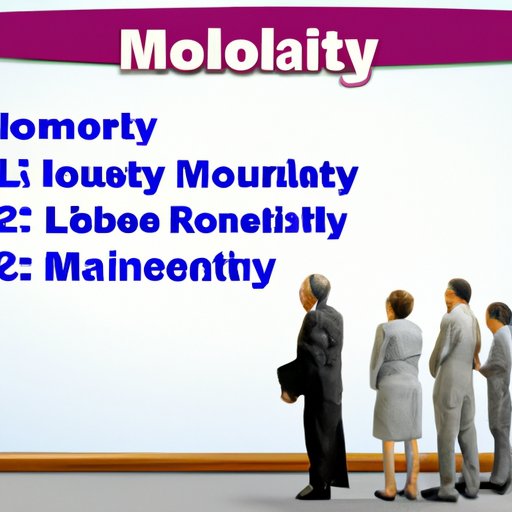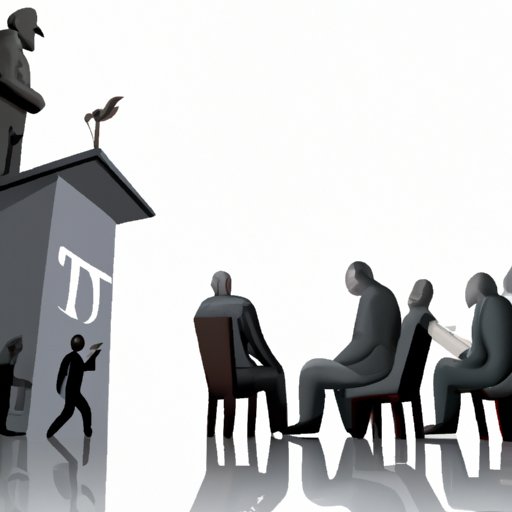Introduction
Moral leadership is the ability to lead individuals and groups in an ethical way that is beneficial to society. It involves understanding and upholding moral values, such as trustworthiness, integrity, justice, and respect, while also promoting positive change. Moral leadership has the power to shape a better future, as it encourages people to think critically about their decisions and take responsibility for their actions.
In this article, we will explore the qualities of a moral leader, analyze the benefits of moral leadership, investigate the challenges faced by moral leaders, discuss strategies for developing moral leadership skills, and debate the role of moral leadership in politics.

Exploring the Qualities of a Moral Leader
Moral leaders have certain qualities that set them apart from other leaders. They have strong moral convictions and are committed to doing what is right, even when it is difficult or unpopular. They demonstrate honesty and integrity and are willing to stand up for their beliefs. Additionally, they are open-minded and willing to listen to different perspectives. They show respect for others, even when they disagree, and strive to create an environment of inclusion and collaboration.
There are many real-life examples of moral leaders, both past and present. Mahatma Gandhi is one of the most well-known examples. He was a leader of the Indian independence movement and a champion of non-violent protest. He believed in the power of civil disobedience and was willing to sacrifice his own freedom in order to bring about social change. Nelson Mandela is another example of a moral leader. He was the first black president of South Africa and fought for racial equality and human rights. He advocated for peaceful negotiation and compromise rather than violence and militarism.

Analyzing the Benefits of Moral Leadership
Moral leadership can have a profound impact on society. It can help build trust and respect between individuals and groups, foster innovation and creativity, and encourage ethical behavior. Here, we will look at each of these benefits in more detail.
Building Trust and Respect
One of the most important benefits of moral leadership is that it can help build trust and respect between individuals and groups. Moral leaders strive to create an atmosphere of mutual understanding and appreciation. They listen to different points of view, take everyone’s opinions into account, and seek to find common ground. This helps to create a sense of unity and belonging, which can lead to greater collaboration and problem-solving.
Encouraging Innovation and Creativity
Moral leadership also encourages innovation and creativity. Moral leaders value diversity and recognize the importance of different perspectives. They understand that embracing new ideas and approaches can lead to breakthroughs and solutions. They create an environment where individuals feel free to express their thoughts and take risks without fear of retribution.
Promoting Ethical Behavior
Moral leadership also promotes ethical behavior. Moral leaders set a good example and inspire others to do the same. They encourage people to think beyond their own self-interest and work for the greater good. They challenge individuals to consider the consequences of their actions and strive to make decisions that are fair and just.
Investigating the Challenges Faced by Moral Leaders
While moral leadership can have positive effects on society, it also comes with its own set of challenges. Moral leaders often face conflicting interests and values, as well as pressure from political and social forces. Here, we will look at each of these challenges in more detail.
Conflicting Interests and Values
Moral leaders must navigate conflicting interests and values. They must be able to balance the needs of various stakeholders, such as shareholders, employees, customers, and society at large. This can be difficult, as different groups may have competing interests. Moral leaders must be able to identify solutions that satisfy everyone’s needs.
Pressure from Political and Social Forces
Moral leaders also face pressure from political and social forces. They must be able to stand up for their beliefs and defend them against those who oppose them. This can be especially challenging in times of political or social unrest, as moral leaders may be targeted by those in power.
Discussing Strategies for Developing Moral Leadership Skills
Developing moral leadership skills is essential for anyone wanting to become a successful leader. Here, we will look at three strategies for developing moral leadership skills.
Creating a Culture of Open Communication
The first strategy for developing moral leadership skills is to create a culture of open communication. Moral leaders need to be able to listen to different perspectives and understand the needs of their team members. They should strive to create an environment where everyone feels comfortable expressing their thoughts and concerns. This will help foster collaboration and trust within the group.
Practicing Empathy and Self-Reflection
The second strategy for developing moral leadership skills is to practice empathy and self-reflection. Moral leaders should strive to put themselves in the shoes of others and understand their point of view. They should also take time to reflect on their own beliefs and values and consider how their decisions will affect those around them.
Adopting a Growth Mindset
The third strategy for developing moral leadership skills is to adopt a growth mindset. Moral leaders should never stop learning and growing. They should be open to feedback and criticism and be willing to make changes when necessary. They should also embrace failure as an opportunity to learn and grow.

Debating the Role of Moral Leadership in Politics
Moral leadership can also play an important role in politics. Political leaders must be held to a higher standard of ethics and morality, as their decisions can have far-reaching consequences. Here, we will look at two aspects of the role of moral leadership in politics.
The Need for Ethical Decision-Making
The first aspect of the role of moral leadership in politics is the need for ethical decision-making. Political leaders must make decisions based on principles of justice and fairness, not purely on their own self-interest. They must strive to serve the public interest and act in ways that benefit the greater good.
How Moral Leadership Can Influence Policy
The second aspect of the role of moral leadership in politics is how it can influence policy. Moral leaders can use their influence to advocate for policies that promote social justice and equality. They can also speak out against policies that are unjust or unethical. By doing so, they can help ensure that the laws and regulations in place are fair and equitable.
Conclusion
In conclusion, moral leadership is an essential part of any successful organization. It can help build trust and respect, foster innovation and creativity, and encourage ethical behavior. It can also play an important role in politics, as ethical decision-making is essential for creating policies that benefit the greater good. Finally, there are several strategies for developing moral leadership skills, such as creating a culture of open communication, practicing empathy and self-reflection, and adopting a growth mindset.
Moral leadership is a powerful tool for creating positive change in the world. It is essential for creating a better future and ensuring that everyone is treated fairly and equally. By understanding the importance of moral leadership and developing our own moral leadership skills, we can help create a more just and equitable society.
(Note: Is this article not meeting your expectations? Do you have knowledge or insights to share? Unlock new opportunities and expand your reach by joining our authors team. Click Registration to join us and share your expertise with our readers.)
